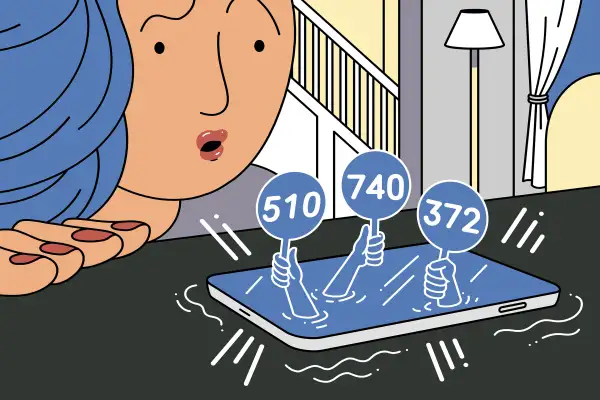Desperate House Hunters Are Making Offers on Homes That Aren't Even for Sale

No for sale sign? No problem. Try to buy it anyway — at least that’s what many burned-out homebuyers are doing these days.
According to agents, unsolicited offers are on the rise, as house hunters struggle to find affordable properties in a market plagued by rising prices, low supply and bitter competition.
It’s impossible to say exactly how often this is happening, but it’s easy to see the appeal. Total for-sale housing inventory is down 31% from this time last year, and nearly two-thirds of buyers found themselves in bidding wars in June.
“We’re experiencing such a housing crunch and drought that buyers are taking things into their own hands,” says Dana Bull, a real estate agent with Sagan Harborside Sotheby's International Realty in Marblehead, Massachusetts. “They’re just trying to drum up a home to buy.”
Why am I getting texts about buying my house?
The approach looks something like this — A buyer has their heart set on a specific neighborhood or community but has been unsuccessful snagging a home there. After months of searching, they decide to pivot, targeting unlisted homes in the area instead.
They (or their agent) will knock on doors, send out letters or even text owners with an out-of-the-blue offer to buy their house. Sometimes, the letters include family photos. In others, there’s an actual number attached to the deal.
Real estate investors have been using this strategy for years — and some are becoming more aggressive in today’s hot market. According to data from Redfin, investor home purchases hit a record high last quarter.
“These letters have been kind of commonplace in the investor space for a while,” Bull says. “Where we’re seeing an uptick is in just regular, single-family homebuyers.”
A creative approach that rarely works
Unfortunately, while more buyers are attempting this approach, agents say it rarely works. Scott Barrows, a real estate agent with Keller Williams in Rochester, New York, recently sent out over 1,200 unsolicited offer letters — 500 for one buyer and 750 for another — none of which were successful.
“This worked out well for me, but not my buyers,” Barrows said. While Barrows ended up getting a few listings out of the mailings (and $1.5 million in sales!), all the homeowners wanted prices outside of his buyers’ price range. Eventually, they opted to rent instead.
Phillip Salem, a real estate broker with Compass in New York City, also says this approach is ineffective, estimating that unsolicited offers are “99% of the time unsuccessful.”
In his five years in the industry, Salem’s seen the approach work just once.
Here’s how it went down: Late last year, Salem called up the owner of an apartment his buyer was eyeing (the client had actually lost out on the unit months earlier) and tried to strike a deal. In the end, Salem says, “the one in a million chance was there,” and the owner agreed to sell — for $300,000 more than he’d paid for it just four months prior. It was “truly a matter of luck,” he says.
To be clear, instances like these are rare — and Bull, who has actually written some letters of her own, is another testament to that.
“My husband and I want to buy a new house, and we’re focused on a very small, specific neighborhood where there are about 300 homes,” Bull says. The pair has reached out to seven homeowners in the area — and only one has responded (they weren’t interested.) The other six? Crickets.
“It’s like finding a needle in a haystack,” she says.
Exceptions to the rule
Greg Burns, a real estate agent with Compass in Hawaii, has seen unsolicited offers work several times — and it even inspired him to start his own private listing platform, DropOffer. In the first instance, he simply knocked on the door and asked the homeowner to consider selling. The owner was “shocked,” Burns says, but after some negotiations, agreed.
Another time, Burns helped his client buy an unlisted vacation home in Hawaii — a beautiful, five-bedroom, five-bath property overlooking the ocean.
“I will never forget when Greg called and said he has an interested buyer for our home,” says George Fisk, the homeowner in this case. “I immediately responded that, for the right price and terms, we would sell. It worked out great for everyone.”
On this one, it was all about timing, Burns says. The Fisks — former buyers of Burns’ — had been considering a sale for a while but were hesitant to put their home on the market, citing the hassles and loss of privacy it typically comes with.
“We had some recent life changes and friends move to another part of the area that we wanted to be closer to,” Fisk says. “We thought that this could be a great opportunity for us to make a move while selling privately and likely for more than the on-market would have brought us.”
Scott Harris, a real estate agent with Brown Harris Stevens in New York, has also seen this tactic work when timed right.
Harris recently found his buyer an apartment on the Upper West Side of Manhattan this way. In this case, the owners were “90% of the way to going to market mentally,” he says. “We helped them get a good price that worked without the normal brain damage of going to market.”
Making an unsolicited offer work for you
If timing your offer perfectly isn’t possible — and it’s usually not — you can play what Bull calls the “numbers game:” Send as many letters as possible, and just don’t be choosy about what you’re looking for.
“If you do it repetitively and you’re not super picky, you’ll eventually hit a seller that’s kind of stuck in a hard place or who thinks your offer is compelling,” she says.
Do your research and target homeowners who are most likely to sell. These might include owners without kids (or at least young ones), who are behind on their mortgage, who own other homes (meaning it may be a vacation or second home) or have listed their home previously and taken it off the market.
This approach is common with real estate investors — ones looking for homes to flip or rent out. If you’re looking for something more specific, though, you’ll need to be more detailed with your pitch.
“If you’re going to be writing these letters, they can’t just be this canned boilerplate,” Bull says. “You need your letter to be impactful and specific to the home.”
According to Nada Rizk, another agent with Brown Harris Stevens, having your finances in order can also make your unsolicited offer more appealing. For example, get preapproved for a mortgage and make sure you have your down payment ready. These deals also tend to go smoother if you can pay in cash. Being flexible can also help — especially with your closing date and timeline for moving into the house.
“When submitting an unsolicited offer, you’re trying to make a deal with someone who is psychologically not prepared to sell so therefore has no place to go to,” Rizk says. “In some instances, it’s wise to offer them to stay on as tenants while looking for their next move.”
At the end of the day, though, agents say to prepare for failure — no matter how many stops you pull out.
“I don’t discount writing these letters,” Bull says. “Do it. Write the letters just so you can say to yourself that you did everything you could. Just know it’s not super effective.”
More from Money:
‘Make Me Move’: Sellers Are Listing Their Homes at Ridiculous Prices Just to See What Happens
Finding a Home Is so Hard Right Now That Buyers Are Scouring Obituaries and Divorce Notices
